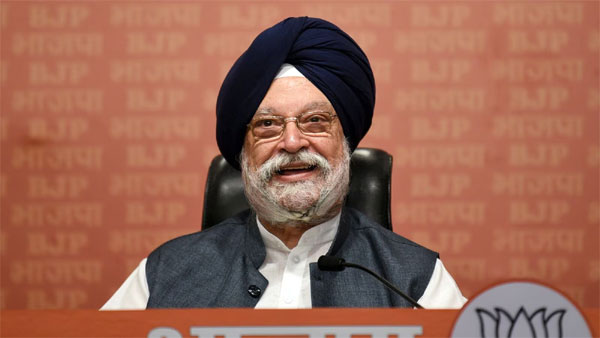Daijiworld Media Network - New Delhi
New Delhi, Aug 21: Union petroleum and natural gas minister Hardeep Singh Puri told Parliament on Thursday that India has successfully reduced petrol and diesel prices despite rising international crude oil costs, while strengthening its energy security through measures like ethanol blending and renewable adoption.
Puri said that domestic fuel prices have dropped to Rs 94.77/litre (petrol) and Rs 87.67/litre (diesel) in Delhi from Rs 110.04 and Rs 98.42 respectively in November 2021. This, despite crude oil prices jumping from $55 per barrel in March 2015 to $116 per barrel in June 2022.
The government, he explained, tackled this pressure through steps like diversifying crude sources, expanding domestic oil production, and invoking Universal Service Obligations to ensure uninterrupted fuel supply across the country.

To cushion consumers, excise duties were cut by Rs 13/litre on petrol and Rs 16/litre on diesel in 2021 and 2022, with a further ?2/litre retail price cut by oil companies in March 2024. Although excise duty was later increased in April 2025, Puri clarified that the rise was not passed on to consumers.
Highlighting India’s broader energy strategy, the minister said ethanol blending in petrol has played a vital role. Under the Ethanol Blended Petrol (EBP) Programme, blending levels hit 10% in June 2022, rose to 12.06% in 2022–23, and surged to 19.93% in July 2025.
This move has helped save over Rs 1.44 lakh crore in oil imports and enabled faster payments of Rs 1.25 lakh crore to farmers since 2014-15. The ethanol push has also reduced CO2 emissions by 736 lakh metric tonnes and substituted over 244 lakh metric tonnes of imported crude.
In addition to ethanol, the government is encouraging the adoption of CNG, LNG, hydrogen, biofuels, and electric vehicles, Puri said, underscoring a push toward clean energy and reduced reliance on fossil fuel imports.
To ensure affordability in remote areas, public sector oil marketing companies have implemented intra-state freight rationalisation, narrowing fuel price disparities within states.
With over 85% of India’s crude oil imported, fuel pricing remains market-linked, but the Centre, according to Puri, continues to take calibrated decisions to protect consumers while advancing long-term energy sustainability.